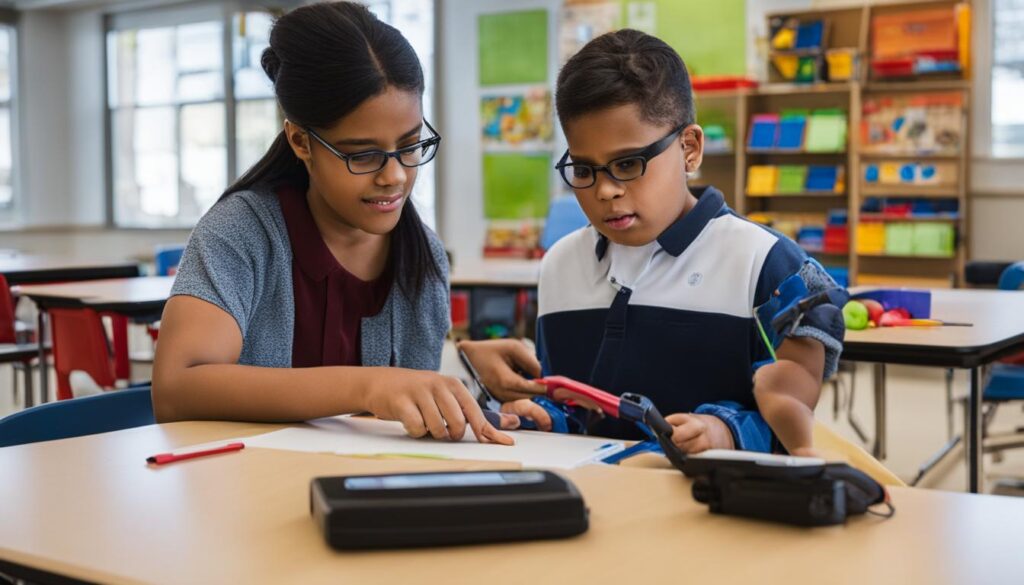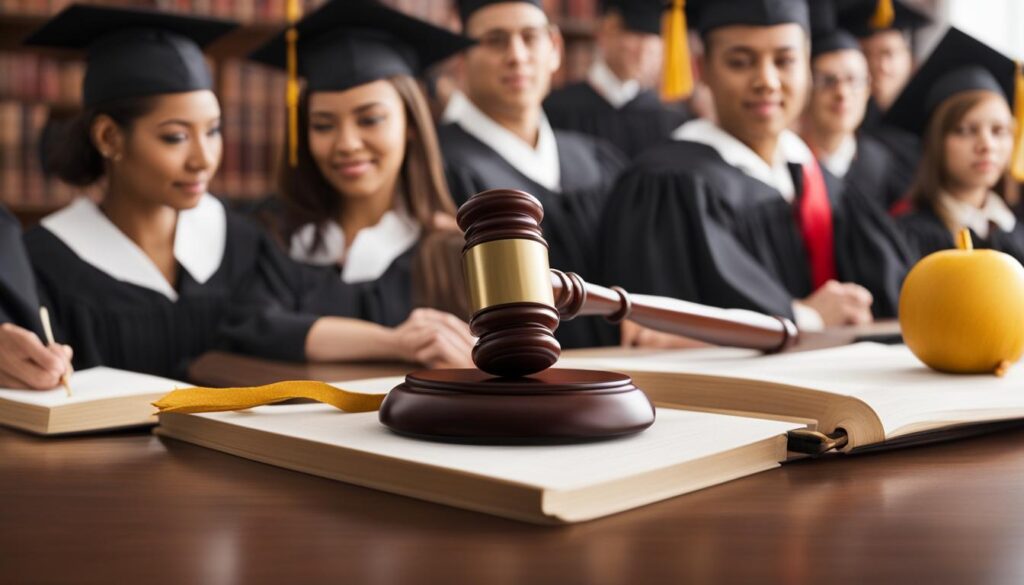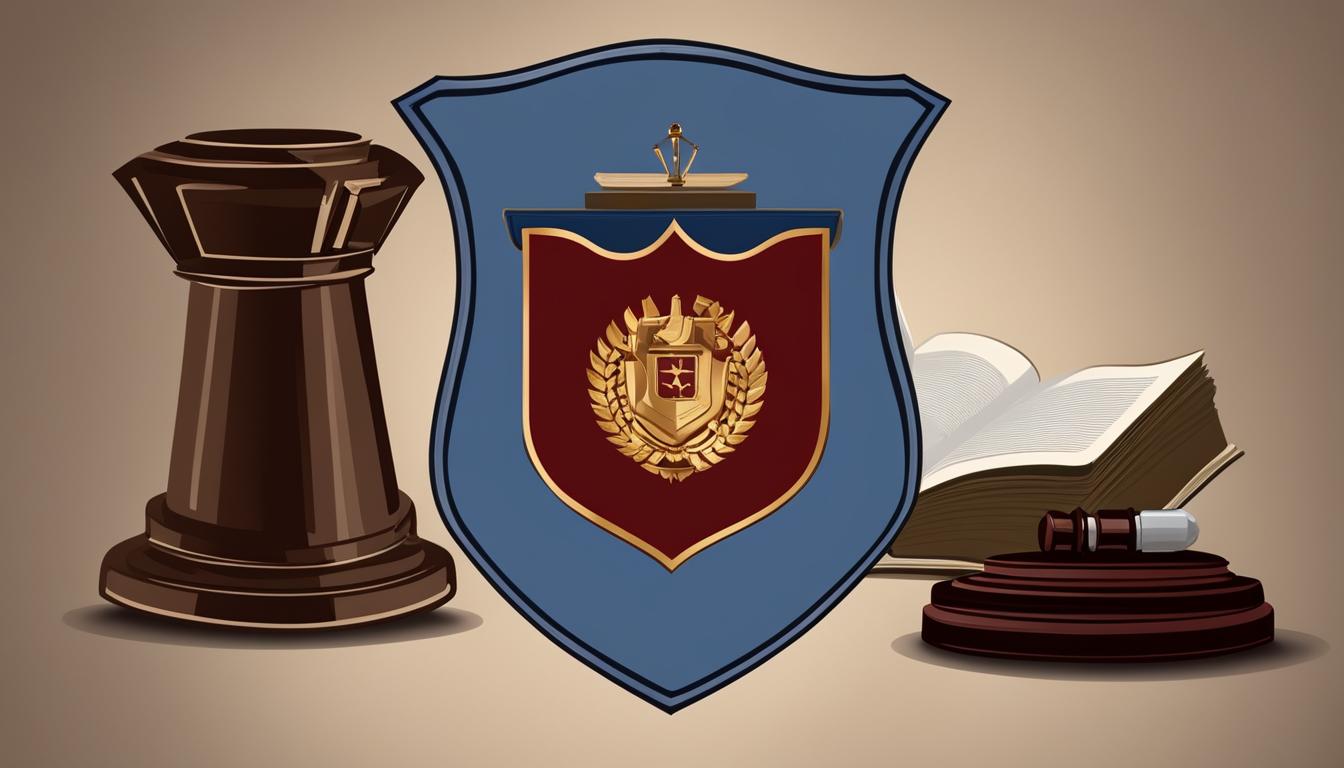Welcome to Education Law Solutions, where we are dedicated to providing comprehensive legal support and advocacy for educational issues. Our team of experts specializes in education law and strives to protect the rights of students, parents, and educators. Whether you need assistance with special education needs, school discipline advice, or resolving educational disputes, we are here to guide you through the complexities of education law.
At Education Law Solutions, we understand that navigating the education system and advocating for student rights can be challenging. That’s why we offer a range of services, including education law consultancy and support for educational dispute resolution. We believe in ensuring educational equity and providing legal aid for those in need.
With our expertise in education law, we are well-equipped to address various educational issues, including legal assistance for special education needs and educational negligence claims. Our education law solicitors are committed to upholding your legal rights in education and providing sound advice to help you navigate school disciplinary procedures and parental rights in education.
Our mission is to protect the rights of students and families, promote educational equity, and offer legal aid for educational issues. Trust us to be your partner in safeguarding educational rights and advocating for the best interests of students and families.
Key Takeaways:
- Education Law Solutions offers comprehensive legal support and advocacy for educational issues.
- We specialize in education law and provide assistance for special education needs, school discipline, and educational disputes.
- Our education law solicitors guide you through the complexities of education law and protect your legal rights in education.
- We are committed to promoting educational equity and providing legal aid for those in need.
- Trust Education Law Solutions to advocate for the rights of students and families and ensure the best outcomes in educational matters.
Understanding Education Law and Student Rights Advocacy
In this section, we will provide an overview of education law and the importance of student rights advocacy. Education law plays a crucial role in safeguarding the rights of students and ensuring a fair and inclusive education system. It encompasses various legal frameworks and regulations that guide educational institutions and protect the rights of students and their families.
Introduction to Section 504 and the Rehabilitation Act
One significant aspect of education law is Section 504 of the Rehabilitation Act. This federal law prohibits discrimination against individuals with disabilities in educational institutions that receive federal funding. It ensures that students with disabilities have equal access to education and reasonable accommodations to support their learning needs. Section 504 applies to all public and private institutions that receive federal financial assistance, including schools, colleges, and universities.
The Role of the Office for Civil Rights in Safeguarding Educational Rights
The Office for Civil Rights (OCR) is a key player in the enforcement of education law and the protection of student rights. As part of the U.S. Department of Education, the OCR works to ensure compliance with federal laws that relate to civil rights in education. It investigates complaints of discrimination, investigates educational institutions for violations, and provides guidance on how to address and rectify issues related to civil rights in education.
Defining a “Free Appropriate Public Education” (FAPE)
One of the essential principles in education law is the guarantee of a “Free Appropriate Public Education” (FAPE) for all students. Under the Individuals with Disabilities Education Act (IDEA) and Section 504, students with disabilities are entitled to receive education that is tailored to their individual needs and provided at no cost to them or their families. Schools must provide appropriate supports, specialized instruction, and related services to ensure that students with disabilities can access and benefit from their education.
By understanding education law and the rights it protects, individuals can effectively advocate for student rights and work towards creating a more inclusive and equitable education system. In the following sections, we will delve deeper into specific areas of education law and how they impact different aspects of education. Stay tuned for valuable insights and practical guidance on legal assistance for special education needs, school discipline procedures, educational dispute resolution, parental rights in education, and more.
Legal Assistance for Special Education Needs
Students with special education needs require unique support and accommodations to thrive academically. At Education Law Solutions, we provide comprehensive legal assistance to individuals with special education needs, ensuring that they receive the necessary support to succeed in their educational journey.
Evaluation and Placement Processes Under Section 504
Under Section 504, students with disabilities are entitled to an evaluation process that determines their eligibility for special education services. This evaluation considers various factors, including educational records, assessments, and input from parents and teachers. Based on the evaluation results, students are placed in an appropriate educational setting that meets their individual needs.
In a complex process that requires careful consideration, our team of experts at Education Law Solutions guides families through the evaluation and placement processes. We ensure that students receive an accurate evaluation and are placed in an educational environment that supports their unique requirements.
Key Components of an Effective Special Education Program
An effective special education program consists of key components that foster student growth and development. These components include:
- Individualized Education Plans (IEPs): IEPs outline the specific goals, accommodations, and services tailored to meet the individual needs of students with disabilities.
- Related Aids and Services: Students may require additional aids and services, such as assistive technology, counseling, or specialized transportation, to fully access their education.
- Qualified and Trained Personnel: It is essential to have qualified professionals who are trained in providing the necessary support and accommodations for students with special education needs.
- Parental Involvement: Collaboration between parents, educators, and administrators is crucial in developing and implementing effective special education programs.
Education Law Solutions recognizes the importance of these key components and supports families and educational institutions in ensuring their implementation. Our team works tirelessly to advocate for students with special education needs, promoting an inclusive and supportive educational environment.

We are committed to providing legal assistance and guidance to individuals with special education needs, ensuring that they receive the appropriate support and accommodations to unleash their full potential.
Education Law Support: Ensuring Compliance with Federal Mandates
Compliance with federal mandates is crucial for upholding educational rights and ensuring that students receive the education they are entitled to. At [Education Law Solutions](https://www.educationlawsolutions.com/), we understand the complexities of education law and the legal obligations that educational institutions must adhere to. Our experienced team of education law professionals is dedicated to providing comprehensive support and guidance to ensure compliance with federal mandates.
Education law support is essential in promoting equal access to education and protecting the rights of students. Our experts can assist educational institutions in navigating the complex landscape of federal mandates, ensuring that they fulfill their legal obligations. We provide guidance on matters such as:
- Developing policies and procedures that comply with federal mandates
- Implementing inclusive educational practices
- Addressing issues related to student discipline
- Protecting the rights of students with disabilities
By partnering with Education Law Solutions, educational institutions can proactively address compliance challenges and create an environment that fosters educational equity. We work closely with our clients to develop tailored solutions that meet their specific needs and help them navigate any legal complexities that may arise.
Education law support is essential in promoting equal access to education and protecting the rights of students.
Our expertise extends to areas including special education, student discipline, and parental rights. We can assist in the development of legally compliant individualized education plans (IEPs) for students with special needs, ensuring that their educational requirements are met. Additionally, our team can provide guidance on school disciplinary procedures, helping institutions maintain fair and consistent practices while upholding the rights of students.
| Key Areas of Education Law Support: |
|---|
| Compliance with federal mandates |
| Developing inclusive educational policies and practices |
| Addressing student discipline issues |
| Protecting the rights of students with disabilities |
When it comes to education, legal compliance is essential. By partnering with Education Law Solutions, educational institutions can ensure that they fulfill their legal obligations and provide an inclusive and equitable educational experience for all students.
Navigating School Discipline Advice and Procedures
School discipline procedures are essential in creating a fair and just learning environment that upholds the rights of all students. In this section, we will provide guidance on school discipline advice and procedures, with a specific focus on the stance of Section 504 regarding non-discrimination and discipline. We will also highlight the importance of procedural safeguards in protecting students from unfair disciplinary actions.
Section 504’s Stance on Non-Discrimination and Discipline
Section 504 of the Rehabilitation Act of 1973 prohibits discrimination against individuals with disabilities in any program or activity receiving federal funding. This includes educational institutions. When it comes to school discipline, Section 504 requires that disciplinary actions should not be based solely on a student’s disability. Instead, disciplinary measures should consider the student’s unique needs and provide appropriate support to address any behavioral issues.
Procedural Safeguards Against Unfair Disciplinary Actions
To ensure fair treatment and protect students from unjust disciplinary actions, procedural safeguards are in place. These safeguards serve as a framework to guide schools in disciplinary matters. Some important procedural safeguards include:
- Notice: Schools must provide notice to students and parents about the disciplinary charges and any potential consequences.
- Opportunity to respond: Students and parents have the right to present their side of the story and participate in disciplinary hearings.
- Appeals process: Students and parents should have the opportunity to appeal disciplinary decisions if they believe they were unfair or based on discrimination.
- Review of evidence: Schools should consider all available evidence before making disciplinary decisions, ensuring that they are fair and supported by the facts.
By understanding these aspects of school discipline, individuals can effectively navigate disciplinary procedures, advocate for student rights, and contribute to the creation of a safe and inclusive learning environment.
Educational Dispute Resolution: Facilitating Fair Hearings
Educational disputes can arise between students, parents, and educational institutions, and it is crucial to have effective dispute resolution mechanisms in place. The resolution of these disputes not only ensures fair hearings but also promotes constructive dialogue and the protection of educational rights. At Education Law Solutions, we understand the complexities of educational disputes and offer expert guidance to resolve them.
Role of Mediation in Resolving Educational Disputes
Mediation plays a crucial role in resolving educational disputes in a fair and collaborative manner. It involves the parties, with the help of a neutral mediator, working towards a mutually agreeable solution. Mediation provides a supportive environment where all parties can express their concerns and interests, leading to creative and personalized solutions. The mediator facilitates communication, keeps the process focused, and ensures that the dispute is resolved in a cooperative and respectful manner.
Understanding the Due Process for Educational Grievances
When it comes to educational grievances, due process ensures that individuals involved have their rights protected. Due process typically involves a series of steps that guarantee a fair and impartial hearing. These steps may include notice of the grievance, an opportunity to present evidence and witnesses, the right to be heard and cross-examine, and a decision based on the evidence presented. Due process ensures that all parties involved have a fair chance to resolve their grievances and seek appropriate remedies.

Parental Rights in Education and Participation in Decision-Making
Parents play a crucial role in their child’s education, and it is essential for them to be actively involved in the decision-making process. When it comes to developing individualized education plans (IEPs), parental involvement is key to ensuring that students receive the support and accommodations they need to thrive academically.
IEPs are personalized plans that outline the educational goals and services for students with disabilities. These plans are developed collaboratively, with input from teachers, specialists, and parents. By actively participating in the IEP process, parents can provide valuable insights into their child’s strengths, weaknesses, and individual needs.
Parental involvement goes beyond the development of IEPs. It includes actively participating in meetings and discussions about their child’s education, advocating for necessary accommodations and modifications, and staying informed about their child’s progress.
Under the Family Educational Rights and Privacy Act (FERPA), parents and eligible students have the right to access and review their educational records. This ensures that parents have the necessary information to make informed decisions about their child’s education. FERPA also protects the privacy of students by restricting access to their records without parental consent.
By understanding their parental rights in education, parents can actively participate in the decision-making process and advocate for the best possible outcomes for their children. Their involvement helps ensure that students receive the appropriate support and accommodations to succeed academically, creating a more inclusive and equitable education system.
Legal Rights in Education: Advocating for Students and Families
Students and families have legal rights that protect them in educational settings and ensure equal access to education. At Education Law Solutions, we are dedicated to advocating for the rights of students and families by providing comprehensive education law support.
The Interplay Between IDEA, Section 504, and ADA
The interplay between the Individuals with Disabilities Education Act (IDEA), Section 504 of the Rehabilitation Act, and the Americans with Disabilities Act (ADA) ensures that students with disabilities receive the necessary accommodations and services to thrive in their educational environments. Our team of experts understands the complexities of these laws and can guide students and families through the legal landscape to ensure their rights are protected.
Protections Against Retaliation in Educational Settings
We recognize the importance of advocating for student rights without fear of negative consequences. That’s why we provide support in navigating the protections against retaliation in educational settings. These protections ensure that individuals can speak up and advocate for their rights without facing repercussions. Our team is committed to empowering students and families by fighting against any form of retaliation.

Trust us to be your partner in safeguarding legal rights in education. At Education Law Solutions, we are here to support and guide you every step of the way.
Educational Negligence Claims and Legal Recourse
Educational negligence can have severe consequences on students and their educational experiences. When educational institutions fail to fulfill their duty of care, it is important for individuals affected by negligence to understand their legal recourse and seek justice. In this section, we will discuss the process of making educational negligence claims and the legal avenues available for addressing instances of negligence.
Identifying Instances of Educational Negligence
To pursue a legal claim for educational negligence, it is essential to identify instances where there has been a breach of duty by educational institutions or their staff. Educational negligence can encompass a range of situations, including:
- Inadequate supervision resulting in accidents or injuries
- Failure to provide appropriate accommodations for students with special educational needs
- Non-compliance with safety regulations
- Failure to address bullying or harassment
- Insufficient support or guidance from educators
By recognizing these instances of negligence, individuals can gather evidence to support their claims and establish the basis for legal action.
Understanding the Legal Process for Addressing Negligence
When pursuing a legal claim for educational negligence, it is important to have a clear understanding of the legal process involved. The exact steps may vary depending on the jurisdiction, but generally, the process includes the following:
- Consultation with an education law expert or solicitor to assess the viability of the claim
- Gathering evidence to support the claim, including documentation, witness statements, and expert opinions
- Filing a formal complaint or initiating legal proceedings against the responsible educational institution
- Engaging in negotiations or mediation to resolve the dispute amicably
- If a settlement cannot be reached, pursuing the claim through court proceedings
- Presenting the evidence and arguments in court to seek compensation for the damages caused by educational negligence
It is crucial to seek guidance from education law experts throughout the process to navigate legal complexities and ensure the best possible outcome.

Education Law Consultancy: Expertise in Policy and Compliance
Staying up to date with education law and compliance can be challenging for educational institutions and individuals. That’s where our education law consultancy services come in. With our expertise in policy and compliance matters, we can provide the guidance and support needed to navigate the complex landscape of education law.
One of the key strategies for staying informed on education law is to rely on professionals who specialize in this field. Our team of experts stays updated on the latest developments in education law, ensuring that we have the knowledge and understanding to assist our clients effectively.
Education law consultancy can also play a crucial role in preventing legal violations. By proactively seeking advice and guidance from our experts, educational institutions can identify potential areas of concern and take the necessary steps to ensure compliance with regulations.
By addressing compliance issues and preventing legal violations, educational institutions can create a safe and inclusive environment that promotes the rights and well-being of students and educators alike. Our consultancy services are designed to provide the support and guidance needed to achieve these goals.
Conclusion: Upholding Educational Equity Through Legal Support
Education law support is essential for maintaining educational equity and safeguarding the rights of students. Throughout this article, we have emphasized the significance of legal assistance in navigating the complexities of the education system. Whether advocating for students with special educational needs, addressing school discipline concerns, or resolving educational disputes, legal support plays a pivotal role in ensuring that students receive the education they deserve.
At Education Law Solutions, we are dedicated to providing comprehensive legal aid and assistance to protect the rights of students and promote educational equity for all. We understand the challenges students and families may face, and we strive to be their trusted partners in safeguarding educational rights. Through our expertise in education law, we work tirelessly to advocate for the best interests of students and families, helping them overcome obstacles and achieve their educational goals.
By collaborating with Education Law Solutions, individuals can access the legal protection they need to navigate the education system confidently. Our team of experienced professionals is committed to upholding educational rights and promoting a fair and inclusive learning environment. Together, we can make a difference in the lives of students, ensuring that they have access to the educational opportunities and support they deserve.
FAQ
What is education law support?
Education law support refers to legal assistance and guidance provided to individuals and educational institutions to navigate and comply with education laws and regulations. It ensures the protection of educational rights and promotes equality and inclusivity in education.
What does student rights advocacy entail?
Student rights advocacy involves advocating for the educational rights of students. It includes ensuring equal access to education, protecting students from discrimination and unfair treatment, and advocating for appropriate accommodations and support for students with special education needs.
What is education law consultancy?
Education law consultancy refers to seeking expert advice and guidance on education law matters. It involves professional consultation to understand legal obligations, navigate complex education law issues, and ensure compliance with regulatory requirements.
How can education law assistance help with educational dispute resolution?
Education law assistance provides support and guidance in resolving educational disputes between students, parents, and educational institutions. It involves helping parties understand their rights, facilitating mediations, and ensuring due process for fair and constructive resolution of disputes.
What legal assistance is available for students with special education needs?
Students with special education needs can receive legal assistance in various aspects. This includes evaluation and placement processes to ensure the provision of appropriate services, support in developing individualized education plans (IEPs), and advocating for related aids and services necessary for their educational success.
How can education law support ensure compliance with federal mandates?
Education law support is crucial in helping educational institutions understand and fulfill their legal obligations under federal mandates. It provides guidance on the requirements and regulations to ensure equal access to education and compliance with federal laws such as the Individuals with Disabilities Education Act (IDEA) and Section 504 of the Rehabilitation Act.
What should individuals know about school discipline advice and procedures?
Individuals should be aware of their rights and the process for addressing school discipline issues. Section 504 of the Rehabilitation Act prohibits discrimination in disciplinary actions, and procedural safeguards are in place to protect students against unfair disciplinary actions. Understanding these aspects empowers individuals to advocate for student rights in disciplinary situations.
What are parental rights in education?
Parental rights in education encompass the rights and responsibilities of parents in their child’s educational journey. This includes participating in the development of individualized education plans (IEPs), accessing and reviewing educational records under the Family Educational Rights and Privacy Act (FERPA), and making informed decisions in collaboration with educational institutions.
How do IDEA, Section 504, and ADA protect students’ legal rights?
IDEA, Section 504, and ADA work together to protect the legal rights of students with disabilities. These laws ensure equal access to education, reasonable accommodations, and protection against discrimination. They also provide avenues for addressing grievances and establish protections against retaliation for individuals advocating for their rights.
What legal recourse is available for educational negligence?
Individuals affected by educational negligence can seek legal recourse through educational negligence claims. This involves identifying instances of negligence, gathering evidence, and pursuing legal action to seek justice and compensation for the harm caused by educational negligence.
How can education law consultancy aid in preventing legal violations?
Education law consultancy provides expertise in policy and compliance matters, enabling educational institutions to stay informed and prevent legal violations. It offers guidance on understanding and implementing legal requirements, developing compliance strategies, and ensuring adherence to education laws and regulations.
How does education law support uphold educational equity?
Education law support plays a vital role in upholding educational equity by providing legal aid and protection to students and families. It ensures compliance with laws, advocates for student rights, and promotes inclusivity in education, thus working towards creating a fair and equitable education system for all.
Source Links
- https://iep-attorney.com/special-education-law-blog/how-does-special-education-law-protect-students-with-disabilities/
- https://www2.ed.gov/about/offices/list/ocr/504faq.html
- https://www2.ed.gov/ferpa

